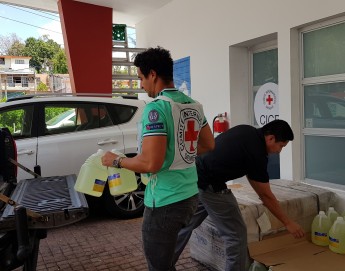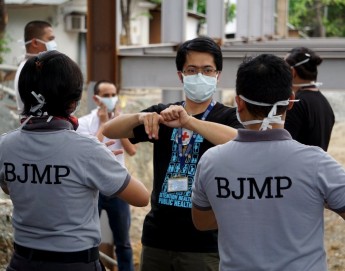
Our work in the Middle East: Operational response to COVID-19
Seeing the impact that the pandemic has had on countries across the globe, responding to the COVID-19 crisis has become a priority for the International Committee of the Red Cross (ICRC) in the Near and Middle East (NAME), as part of our core humanitarian work to protect and help people affected by armed conflict or violence.
With millions already coping with little or no access to health care, lost livelihoods and destroyed economies and infrastructure, this is not a region that is equipped to withstand the outbreak of a pandemic.
COVID-19 has presented a multitude of new and complex challenges for the humanitarian sector. The restriction on movement and goods, suspension of certain field activities, border closures, and a critical lack of protective equipment for staff and volunteers are some of the factors that have dramatically impacted humanitarian aid.
In many places where we work, clean water is a luxury, and soap is non-existent. The implementation of basic infection prevention and control measures can be challenging due to the scarcity of resources.
Health systems in places like Syria, Yemen, or Iraq are simply not prepared to handle a flood of COVID-19 cases without a massive surge in support.
A coordinated response with Movement partners
All delegations in NAME have reoriented their plans to face the challenges that lie ahead, both in terms of adapting existing programs to respond to the shifting needs and developing new ones to tackle COVID-19 head-on.
Across the region, we are working with the National Red Cross and Red Crescent Societies and their International Federation IFRC on ways to spread accurate information, talking about preventive measures to be taken and reminding all that it is not okay to stigmatize those who have COVID-19 or the ones who are treating them.
We are also supporting the authorities managing detention places and camps for internally displaced people. In addition, we have shared advice on the management of bodies of those who succumb to COVID-19.
SYRIA
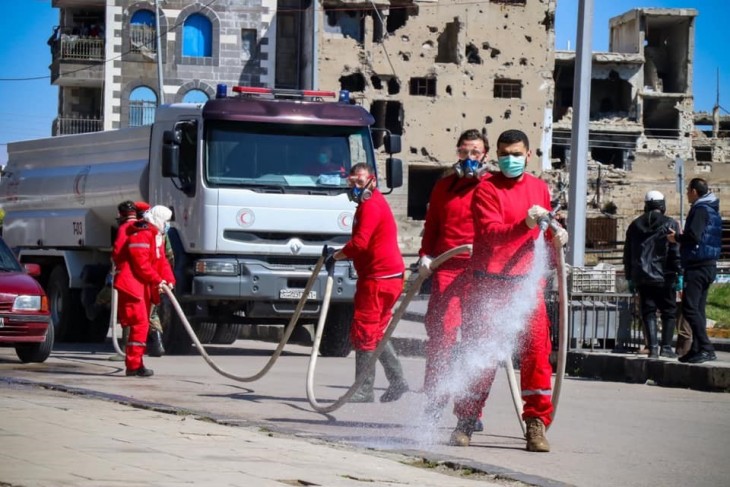
Syrian Arab Red Crescent Society (SARC) disinfection activities in Aleppo. The ICRC supports SARC's activities to mitigate the spread of COVID-19
With COVID-19 reaching the conflict-affected populations of Syria, our focus is to carry out priority and life-saving activities. Large-scale programs in the fields of water, basic infrastructure, health, economic security, and humanitarian protection play a significant role in improving the sanitary and health conditions of millions of people as they face the looming pandemic.
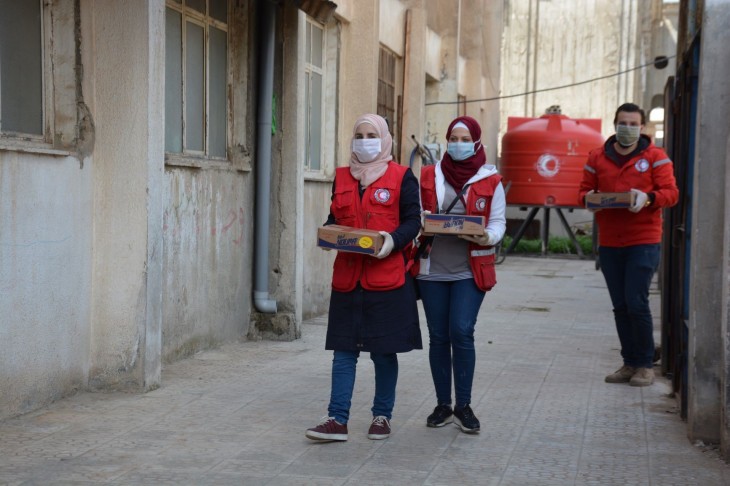
Syrian Arab Red Crescent Society (SARC) soap distribution to internally displaced people in Homs supported by the ICRC. Together, we are providing vulnerable populations with hygiene material to help them mitigate the spread of COVID-19
In Syria, our response is based on three pillars, with the first being provision of hygiene material to:
1) vulnerable populations to help them mitigate the spread of COVID-19 in collaboration with the Syrian Arab Red Crescent SARC
2) SARC for infection prevention and control activities, and
3) selected public health-care facilities. The field hospital at the Al Hol camp, which we jointly run with SARC, continues to offer critical medical services to the camp population.
The second pillar is our support to detention authorities by providing them with disinfectants for premises cleaning, personal protective equipment as well as hygiene materials for detainees.
Thirdly, we are helping ramp up the capacity of the SARC, health structures and humanitarian workers to respond to COVID-19 by providing them with disinfectant material and personal protective equipment for front-line personnel.
Israel and the Occupied Territories
An ICRC team delivers hygiene items to Al Katibe prison in Gaza City
In Israel, the West Bank, and Gaza, we are striving to retain our operational capacity to respond to developments in the conflict and the pandemic.
Our work to ensure the welfare of people deprived of their liberty continues. We are in close contact with the detaining authorities and despite various constraints resulting from the pandemic, our visits to places of detention in Israel, the West Bank, and Gaza will continue, albeit with special precautions to protect the detainee population.
We understand the challenge that the outbreak poses to detaining authorities and are working with them to ensure that alternative means of contact are offered to detainees and their families.
In the struggle against COVID-19, we stand shoulder to shoulder with our partner organizations Magen David Adom (MDA) and the Palestine Red Crescent Society. MDA has launched its largest-ever operation, setting up a special hotline to respond to queries from people who believe they might have been exposed to the virus. MDA volunteers are also visiting homes of those who might have been infected to collect their swab samples. Meanwhile, the Palestine Red Crescent Society is running an ambulance dispatch call center for the Palestinian territory and is channeling relevant calls to the Palestinian Ministry of Health.
Our support to the National Society includes the donation of essential supplies to respond to the outbreak and assistance in communication efforts.
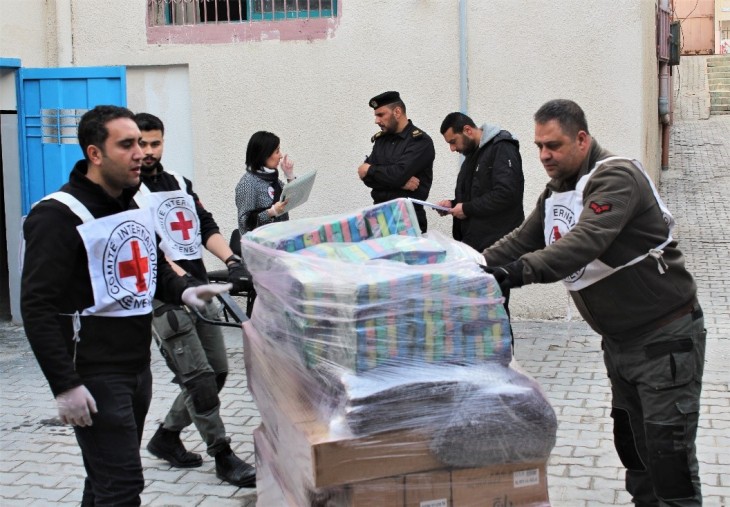
An ICRC team delivers hygiene items to Al Katibe prison in Gaza City
Iraq
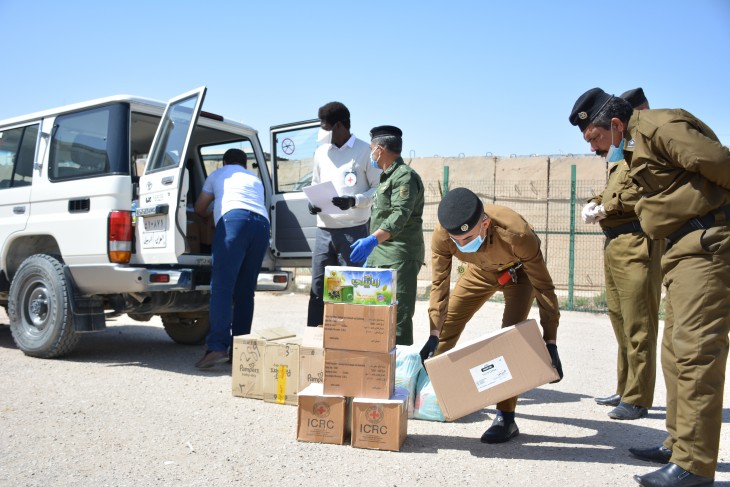
Donation of hygiene materials to prison in Najaf to help them tackle COVID-19. Layth AMEEN/ICRC)
As the current health emergency evolves in Iraq, we are focused on ensuring that our existing humanitarian programmes are not jeopardized in the mid or long term. To address the emerging health-related needs, we are adapting our responses to best suit the people and authorities.
We continue to support health structures across the country, including via monthly drug donations to 18 primary health-care centers and two hospitals. Our work to improve the health of detainees in six prison clinics is going on as planned.
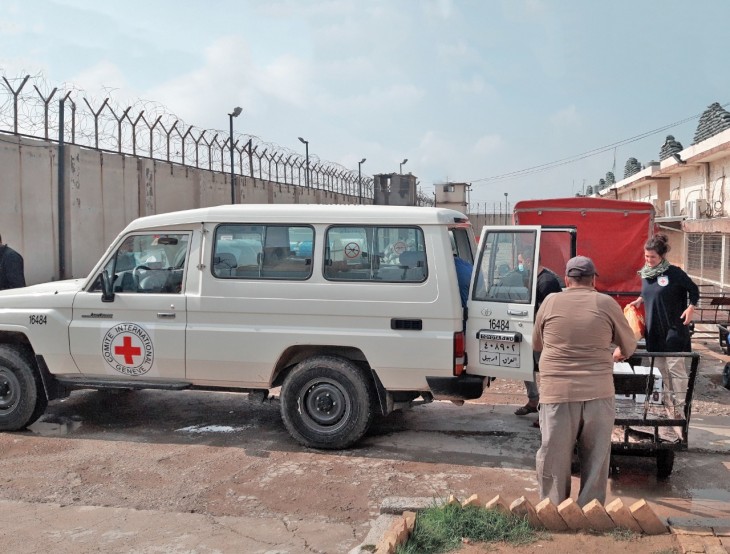
We have supported 27 prisons holding 45,000 detainees with infection prevention items to help them combat COVID-19. Here our teams donate items to prison in Kirkuk. Shady RAMADAN/ICRC)
Additionally, we have provided many medical facilities – including the 18 primary health-care centers and two hospitals, as well as 15 physical rehabilitation centers – with soap, disinfectant, and personal protective equipment like gloves, gowns, and goggles to help them contain the spread of COVID-19. Our teams have also distributed similar material in 27 detention centers that hold 45,000 people.
While important measures such as movement restrictions and office closures help contain the outbreak, they are also creating serious challenges like economic deprivation and political uncertainty. In the long term, we, therefore, plan to step up our assistance to the most vulnerable, including people supported previously to cultivate their lands or set up small businesses, so they could shore up their projects.
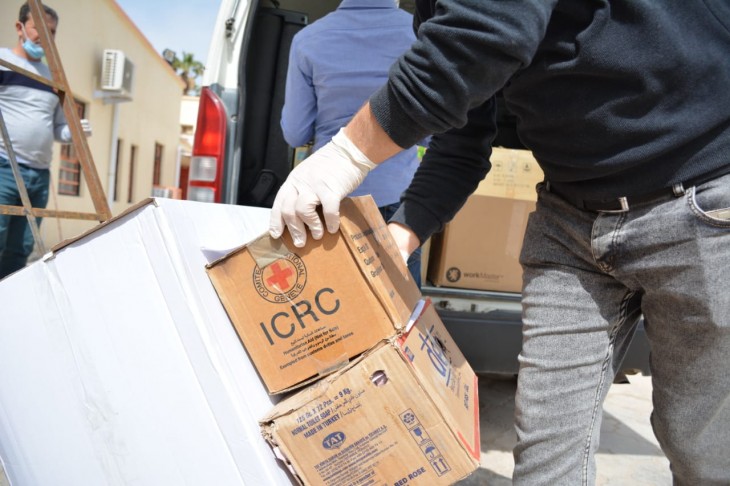
Our teams deliver personal protective equipment and disinfection materials to Shinafiya and Hilal primary health care centers in southern Iraq. Layth AMEEN/ICRC
Meanwhile, we have redirected planned programme funds for 2020 to assist the COVID-19 response of the Iraqi Red Crescent Society (IRCS), which remains in the lead within the International Red Cross and Red Crescent Movement to complement the government's response to health emergencies.
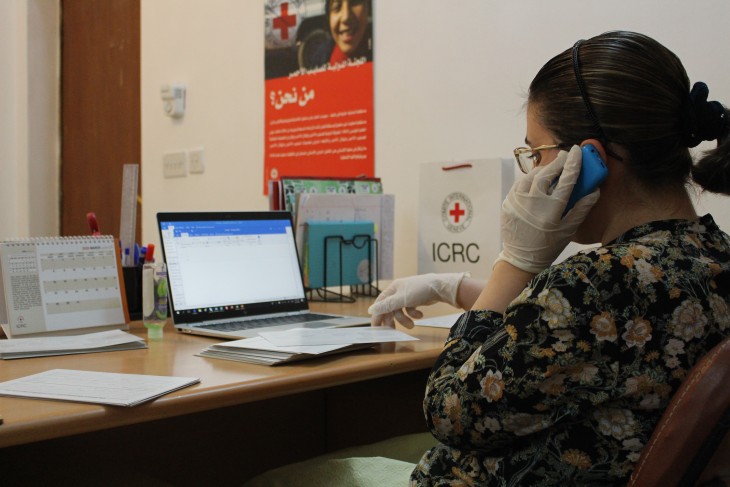
An ICRC colleague in Basra conveys messages to the families of detainees during the COVID-19 pandemic. Ali KHALEEL/ICRC
The priorities of IRCS response include spreading information related to COVID-19 and its prevention as well as providing vulnerable families affected by the prolonged curfew with food and hygiene material.
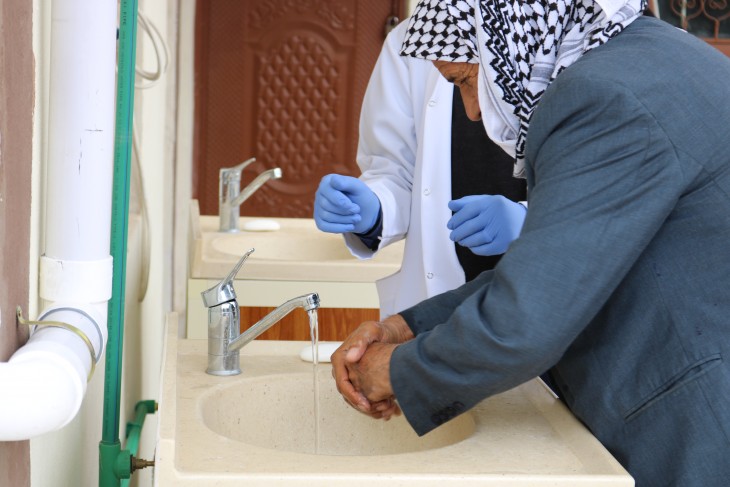
A patient washes his hands at a sink complete with a water tank installed by the ICRC at the entrance of a primary health care center in Khaniqin. Muayad M GHAFUR/ICRC
YEMEN
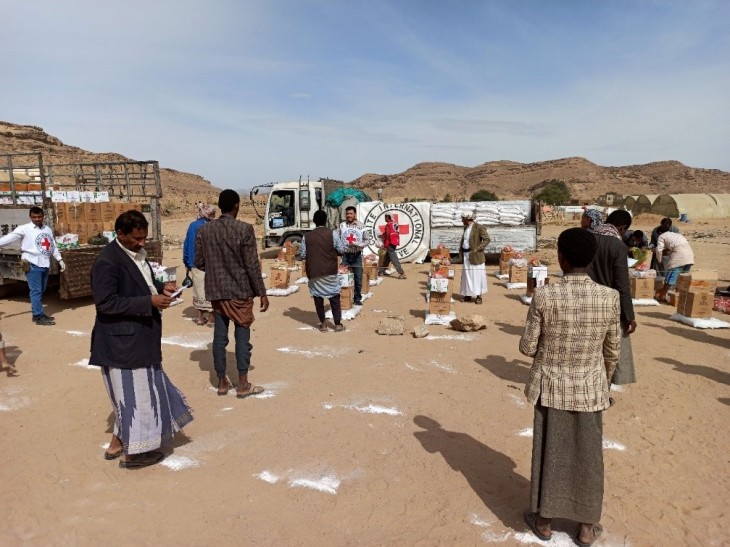
Keeping a two metre distance between yourself and others is key in fighting the spread of coronavirus. This message was regularly repeated during the food distribution that targeted 1,300 displaced families in the Dammaj area of As-Safra district in Sa'ada province, Yemen.
We are aware that in a country where only 50 per cent of health facilities are functional, prevention is indeed the best cure. We continue to promote social distancing during community activities and conduct training sessions on proper hygiene among our target populations, including in detention centres.
We are distributing cleaning and hygiene items to supported hospitals and primary health-care centres and detention facilities, as well as to populations in displacement or in quarantine. Promotion of prevention information through social media, call centres and audio spots remains equally important.
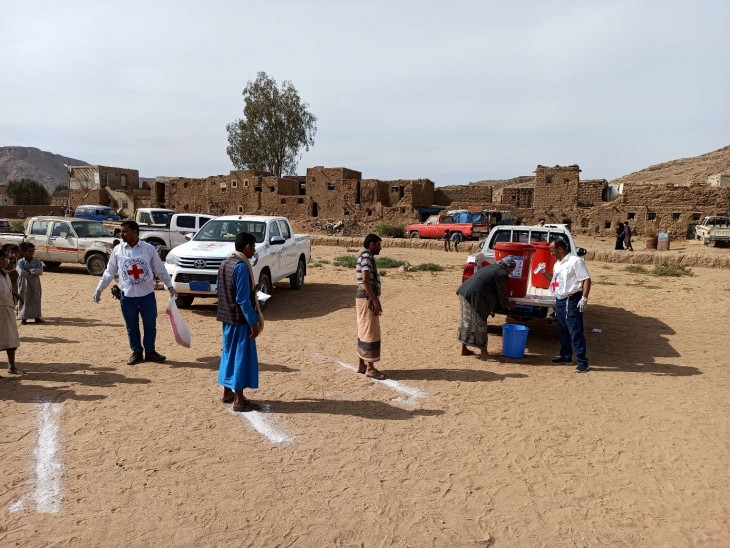
As far as the Movement is concerned, the Yemen Red Crescent Society (YRCS) is leading the response to the pandemic as an auxiliary to the authorities for emergencies and humanitarian affairs. Along with IFRC, the Danish Red Cross, The German Red Cross, and The Norweigan Red Cross we are supporting the YRCS with resources and materials needed.
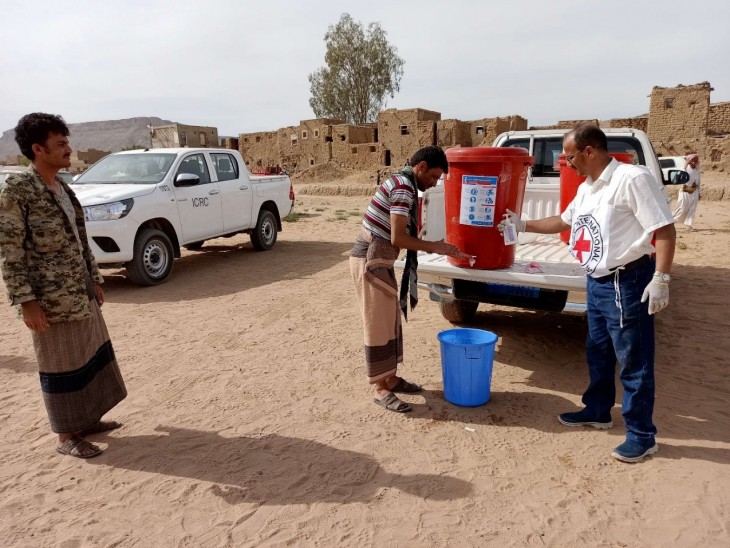
It is important to highlight that in Yemen, there are many other layers of vulnerability for the population even without a COVID-19 crisis. The country continues to face many challenges due to active conflict, seasonal diseases like cholera and dengue, floods, high inflation rates that affect access to food and goods, among others.
We continue our humanitarian work to respond to the needs derived from conflict and support the YRCS in its emergency activities.
IRAN

With the support of the ICRC, the Iranian Red Crescent Society is integrating basic preventive messages in its ongoing mine risk education in Western Iran
The Iranian Red Crescent Society is at the forefront of the Movement response to COVID-19 in Iran through the provision of many services. These include risk communication and public education, screening, treatment of patients, disinfection of prisons, and setting up of post-discharge shelters, as well as livelihood support to vulnerable people who have been affected.
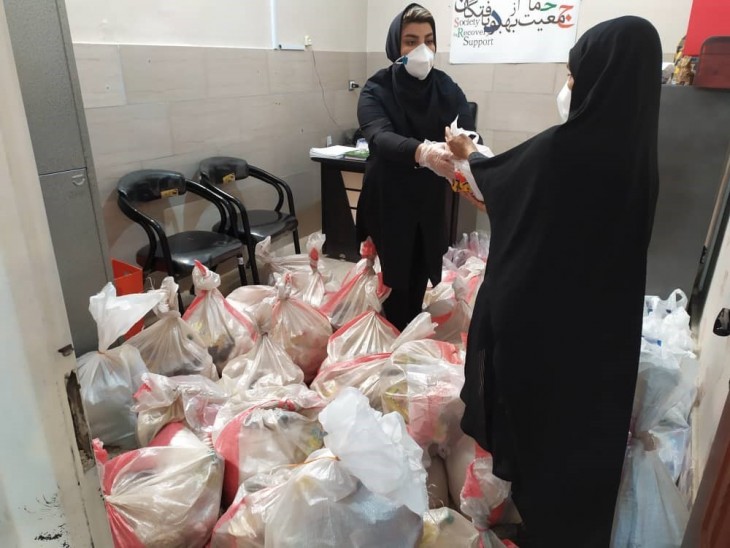
With the support of the ICRC, a local NGO is maintaining its activities to support the most vulnerable families in north east of Iran
We have donated 500,000 Swiss francs to the National Society to help distribute food and hygiene items among 500,000 people who are immunosuppressed and thus at an increased risk of COVID-19 because of ailments like kidney disease, haemophilia or cancer.
In western Iran, we have supported the National Society in integrating COVID-19 awareness activities with the work being carried out to highlight risks related to landmines.
By providing a local NGO in Mashhad, north-east of Iran, with personal protective equipment in time, we have ensured continuity of essential health care as well as restoring family links services to the vulnerable target population.
JORDAN
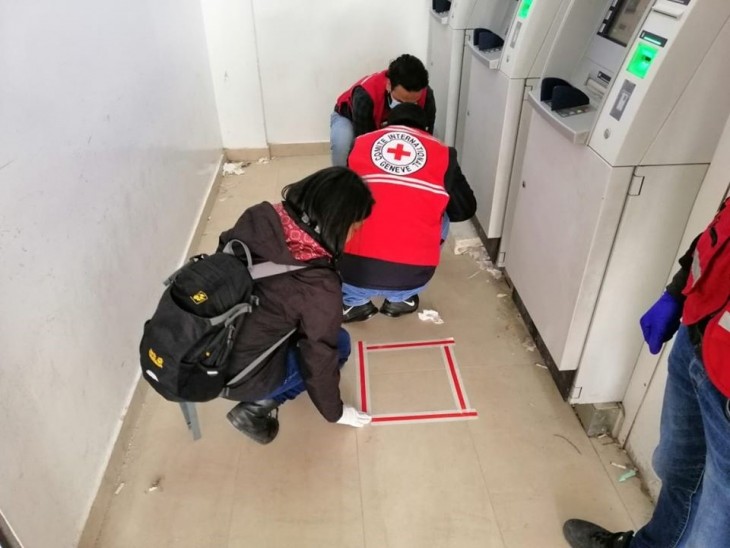
In an effort to decrease the risk of infection, ICRC staff marks the recommended physical distance on the floor in front of ATM machines in Mafraq town, Jordan
In view of the measures being taken worldwide and in Jordan to limit the spread of COVID-19 and given the high vulnerability of the population in correctional facilities nationwide, we have provided personal hygiene items for inmates and protective items for health staff in 18 correctional facilities, five juvenile centers and two main police stations across the country.
Together with the Jordan Red Crescent Society, we have shared information and prevention messages on COVID-19 among the populations we work with.
LEBANON
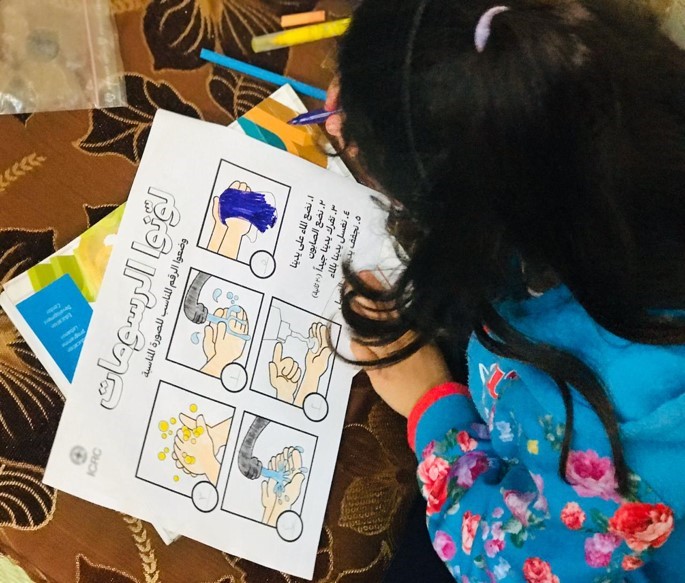
Children from Alwan Center in Ein el Helwe, Lebanon use colouring books with messages on how to reduce the risk of COVID-19 infection, developed by the ICRC
The capacity of Lebanon's already strained public health sector to respond to the current pandemic is limited. The Syrian and Palestinian refugee populations, as well as people in places of detention, are particularly vulnerable to the spread of novel coronavirus.
In response to the pandemic, we are focusing on providing Rafik Hariri University Hospital, our partner since 2016, and the primary hospital responding to the crisis, with personal protective equipment and other medical material, as well as technical support.
Together with the Lebanese Red Cross, sensitization sessions on the prevention and management of coronavirus have been held in the primary-health-care centres that we support and in places of detention. We are providing technical support to detention authorities in their COVID-19 preparedness and contingency planning, apart from supporting the most critical places of detention with personal protective equipment and hygiene material.
In Roumieh prison, by far the country's largest prison holding about 40% of Lebanon's detainee population, we are refurbishing a medical isolation ward.
Additionally, we are working with the Ministry of Justice on a series of special measures to reduce overcrowding and protect the most vulnerable in places of detention. We are also maintaining our regular support to all health facilities within our health program.
EGYPT
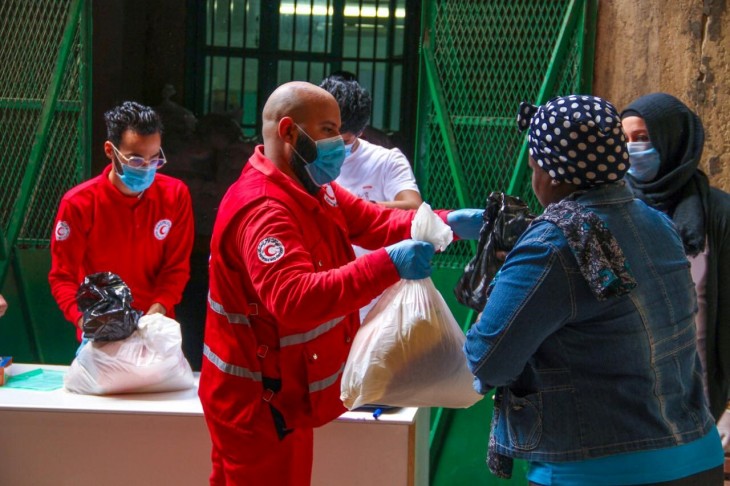
The ICRC in Egypt is closely working with its movement partner, the ERC, to provide support and training to volunteers considering ERC's important role in the national response to COVID-19
In Egypt, we have donated essential items to the Egyptian Ambulance Organization (EAO) for the treatment of over 200 patients suffering from trauma and infections, with the oversight and approval of the Ministry of Health and Population (MoHP). While a part of this stock is for the EAO branches and hospitals in North Sinai, the remaining material has been delivered to paramedics and hospitals in Cairo.
We are working closely with and supporting our Movement partner, the Egyptian Red Crescent, by providing personal protective equipment, advice, and training to staff and volunteers within the framework of their contingency and response plan.
We have ensured that regular and emergency Restoring Family Links services are provided by phone and email to the best extent possible. We are offering to transmit "safe and well" messages on behalf of our usual beneficiaries of the international phone call service to ensure that they remain in contact with their families abroad.
We are re-establishing contact with families of missing people in Egypt to ensure that they are aware of basic hygiene and prevention measures, as well as know what to do as per the guidance of the MoHP and the WHO in case they feel unwell.
Furthermore, we are ensuring that the material to be distributed among the vulnerable populations via our partners includes hygiene items for preventing COVID-19.
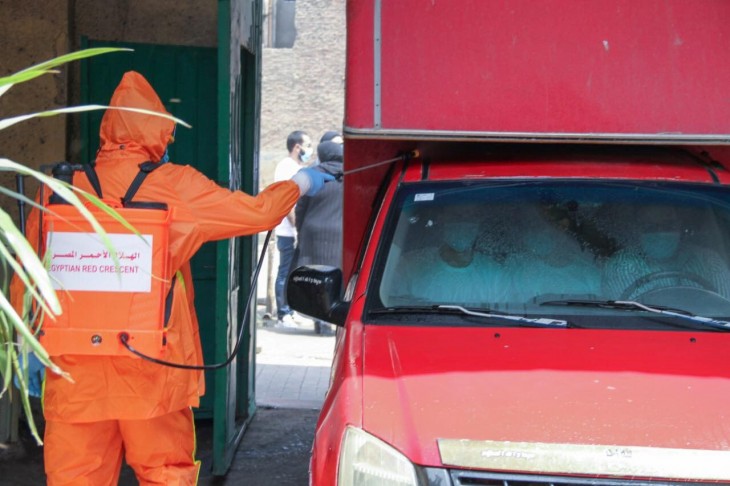
GCC
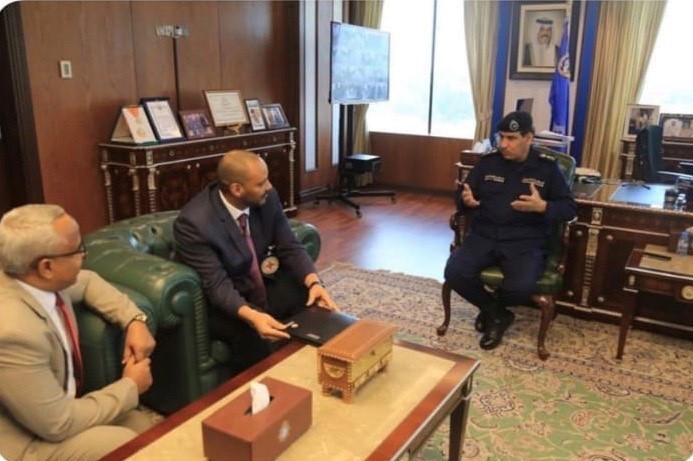
Dialogue with MOI
Our GCC regional delegation has adopted all the existing programmes to the new COVID-19 reality. Our response is centered around protection and assistance programs, fundraising efforts to help those affected in armed conflicts, promoting respect for international humanitarian law, family reunification, and working with our Movement partners.
Primarily, we are helping the authorities control the spread of COVID-19 in places of detention and deportation centres by providing them with technical guidance on health measures.
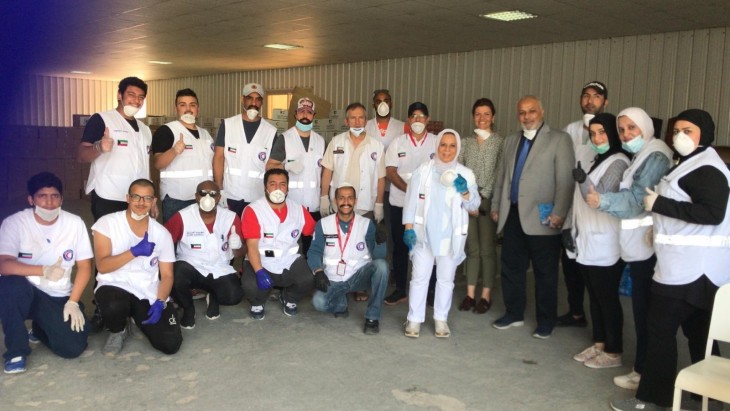
Kuwaiti Red Crescent volunteers
Since the onset of the outbreak, we have joined forces with the GCC National Societies, Oman Charitable Organization and national health authorities to respond to the pandemic. Our joint efforts with the National Societies are reflected in facilitating the exchange of family news during quarantine and promoting the adoption of COVID-19 preventive measures across the GCC.
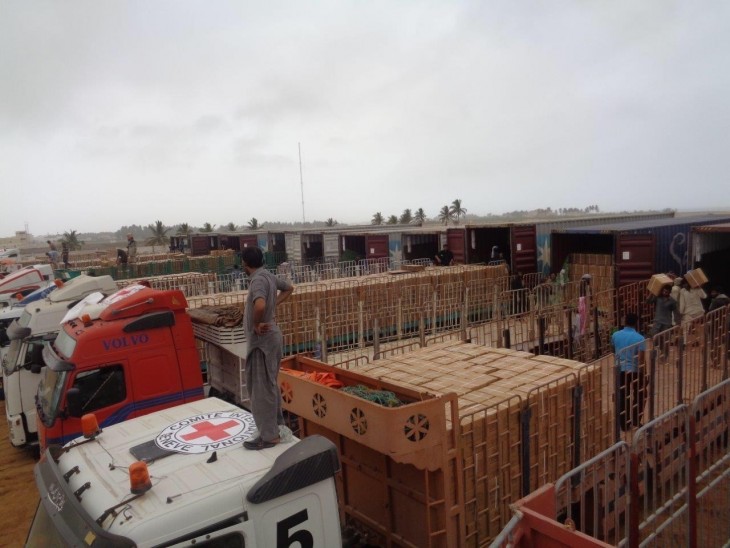
Oman logistic hub
Moreover, we are coordinating with GCC Red Crescent Societies and the national authorities to organize virtual training sessions for the volunteers on COVID-19, management of the dead, and other relevant themes. In addition, we continue to adapt our logistical activities in Salalah to the needs of the people we serve by being in dialogue with the Omani authorities to support and reassure exemptions for humanitarian assistance towards Yemen.
Working with the International Red Cross and Red Crescent Movement
Coordination and cooperation with partners from the International Red Cross and Red Crescent Movement are paramount to the global, regional, and most importantly, country-level response to the pandemic. Since the onset of the crisis, many ICRC delegations have been working closely with their National Society counterparts and the Movement partners to ensure help can reach where it is most needed.
With many National Society staff and volunteers working on the front line of this crisis, we, at the ICRC, along with the IFRC, are supporting them to collectively provide effective, efficient and relevant help to all those who are affected.
The Movement has a longstanding experience in dealing with viral outbreaks, and as a collective, we can contribute with our vast and diverse resources and expertise in a complementary and well-coordinated manner.
Collaboration among the Movement partners ranges from emergency front-line responses like transportation of patients to and from hospitals, support in the safe management of quarantine centers, production and distribution of awareness material, to the ongoing assistance to vulnerable communities such as refugees, migrants, and the internally displaced people.
As a Movement, we are also working together to ensure our front-line staff and volunteers are well-equipped, well-protected, and respected as they carry out their duties. Specialized training, psychosocial support, and volunteer insurance are some of the areas that the Movement partners aim to help the National Societies in.





